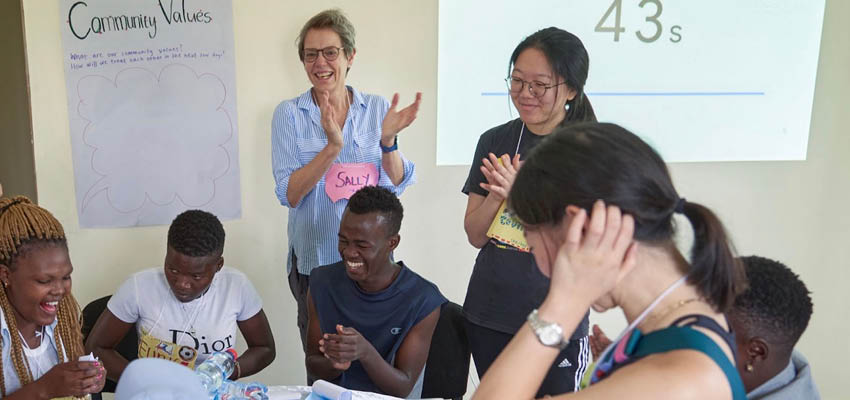
Introduction to a transformative journey
During January 2024 during MIT's Independent Acitivies Period (IAP), our MIT D-Lab team from the fall 2023 D-Lab: Gender and Development class embarked on a transformative journey in Homa Bay County, Kenya. We collaborated with the Society Empowerment Project (SEP) to initiate a D-Lab Community Capacity Building (CCB) workshop aimed at addressing the critical issue of teen pregnancy. In the post-covid era, this region is confronting a rising challenge with increasing teen pregnancies and HIV/AIDS, presenting a complex interplay of societal, health, and educational factors.
We were fortunate to build on the solid foundation laid by the diligent efforts of SEP and previous D-Lab teams. Their comprehensive surveys and interviews provided crucial insights into the multifaceted factors contributing to the high rate of teen pregnancies in the area. Armed with this knowledge, our primary goal was to engage teen parents in a way that would empower them to confidently identify and address their own challenges. With a clear understanding of the issue already established, we shifted our focus to facilitating and implementing a transformative plan.
Our CCB workshop, designed to flow from problem identification to brainstorming solutions, ideation potential solutions, selecting the best options, and then implementing changes, was aimed at fostering a profound sense of agency and self-efficacy among the participants. We strived to do more than just elucidate the complexities of their situations; our aim was to inspire active participation in developing strategies that would not only tackle immediate issues but also improve their overall well-being and health prospects. This workshop was about empowering these young parents to take the reins and become the architects of their own futures.
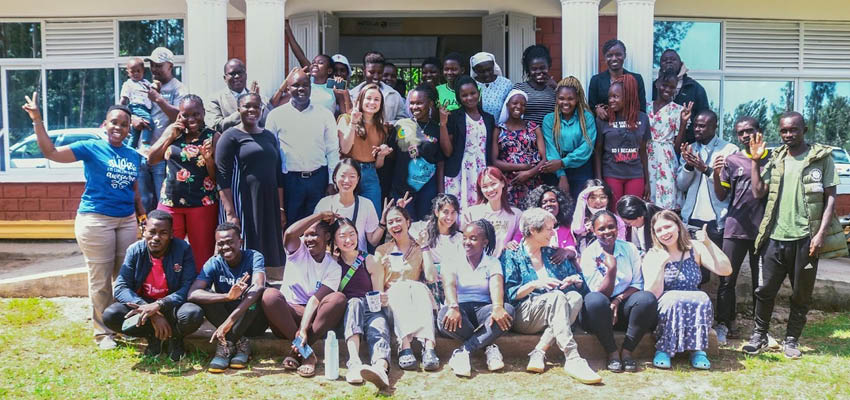
From theory to reality: engaging with CCB workshop
Our journey at the SEP workshop started with a warm introduction to the impressive design and production of reusable pads. The icebreaker activities, where we crafted bracelets and name tags together, fostered an easy-going and friendly atmosphere, greatly encouraging our team. During playtime and lunch with the teen parents, we discovered the surprising similarity of our interests and experiences. This interaction revealed to us that there’s no significant gap between “us” and “them.” We found common ground in our evolving skills in nursing and parenting, learning about love and consideration from the children themselves.
Our ideation process kicked off with a compelling water bottle challenge: using four A4 papers to lift five water bottles more than three inches above the table. Initially, none of the participants believed it was possible. However, within just five minutes, everyone started brainstorming, eventually succeeding in the challenge. This exercise was a heartwarming revelation for the workshop participants, instilling confidence in their abilities to tackle seemingly impossible tasks and test their ideas. This set a positive tone for our workshop, encouraging everyone to start, experiment, and embrace change.
In another highlight, one of our creative team members devised a short theater play in just 10 minutes to demonstrate problem-solving. As organizers, witnessing this level of creativity and engagement was a joy. These moments of active participation made all our post-workshop efforts feel worthwhile. Adapting to the limitations of available technology like projectors, the D-Lab team resourcefully switched to paper posters instead of slides for the CCB workshop. The team were also meticulous in arranging participants at each table, ensuring effective collaboration. We're also grateful to Faith and Sally for their help with childcare during the workshop, creating a more conducive environment for teen parents to engage in discussions.
We are the solution: drafting proposals
An inspiring realization came during a feedback session when one participant remarked, "Then I realized, we are not part of the problem, but part of the solution." This statement encapsulates the empowering spirit of our workshop.
Thanks to the remarkable ideas from our participants, led by our diligent team, we conceived several feasible solutions. These included a program to empower guardians of teen parents, offering preventive support and assistance; initiating sex education and contraception workshops in schools; and launching start-ups for teen mothers to achieve self-sustainability.
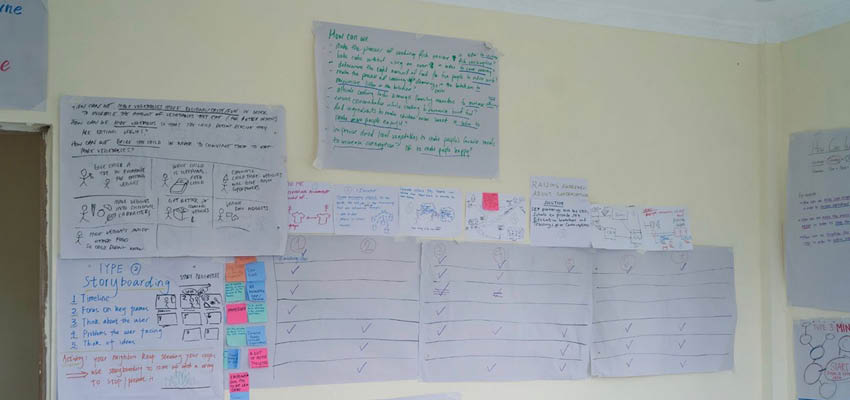
Reflections on the Journey:invaluable memories from fieldwork
Reflecting on our experience in Kenya, it's challenging to distill the experience into a single favorite memory or moment. The trip was a tapestry of new and incredible experiences, making it difficult to compare the various moments that included absorbing the culture, forming new connections, exploring the Social Empowerment Program (SEP), and facilitating our workshop.
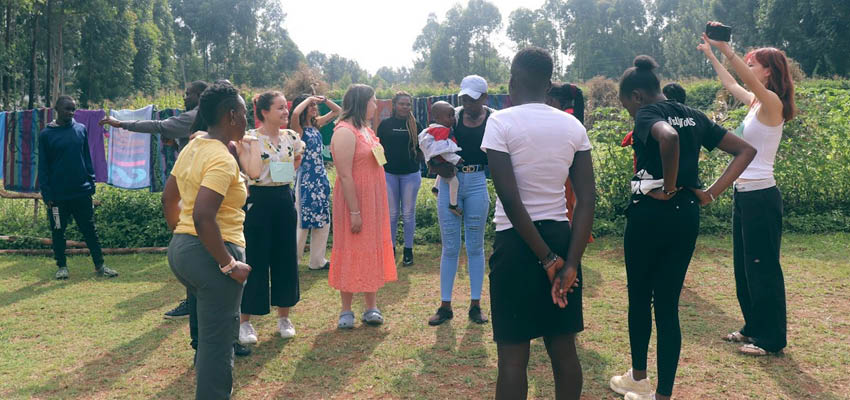
A standout memory for me was the genuine interaction with the people we had previously only discussed during our planning sessions. Throughout the semester, as we designed the workshop, our thoughts often turned to the teen parents who would be participating. We speculated about their lives, but they remained abstract concepts to us. Meeting them in person transformed these abstract ideas into tangible realities. Forming real human connections with the workshop participants was a transformative experience for me.
Another aspect of the trip that we found particularly enriching were the informal interactions during lunch breaks. These moments allowed us to connect not just with the workshop participants but also with other members of SEP like Lorraine and Festus. Their warmth and hospitality greatly enhanced our experience. The cooking sessions, particularly with Lorraine and Mary, were also highlights. Assisting Mary in the kitchen and getting a firsthand taste of local culinary practices was both enjoyable and enlightening.
The contrast between planning the workshop in Boston and implementing it in Kenya was striking. Back in Boston, we were absorbed in theories about social change, transformation, and oppression. In Kenya, these theories leapt off the pages and into real life as we encountered the individuals and contexts we had only previously studied. This experience was both overwhelming and deeply fulfilling, bringing a sense of catharsis.
Empowerment and fostering a sense of agency within the community were at the core of our mission. Observing the development and self-perception change in our workshop participants was a profound experience. It affirmed the value and impact of our work.
A particularly memorable part of the workshop was the ideation session on storyboarding. We encouraged participants to express their ideas through drawing or acting. It was a delightful surprise when one group enthusiastically embraced this task, creating an engaging skit that captivated all of us. This moment underscored the importance of creativity and passion in addressing serious issues. It was heartwarming to see the participants' imagination, enthusiasm, and humor, despite the gravity of the topics we were discussing.
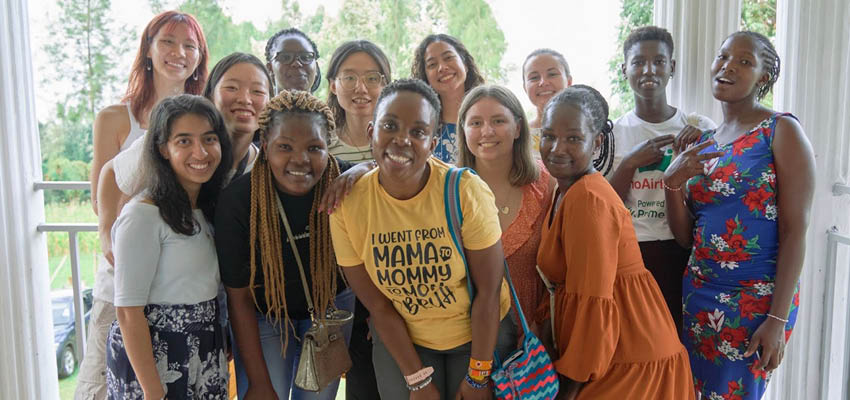
In conclusion, the trip to Kenya was an amalgamation of learning, connection, and empowerment. It was not just an opportunity to impart knowledge but also a chance to witness the incredible resilience and creativity of the people we worked with. Their ability to face challenges with such positivity and imagination was both inspiring and humbling. This experience has left an indelible mark on me, and the lessons learned will continue to resonate in my personal and professional life.
Contributors and authors
Sophia Chen: MIT, Class of 2024
Daisy Wang: MIT, Class of 2024
Aashini Shah: MIT Health Sciences and Technology graduate student
Yutong Wu: Wellesley College, Class of 2026
Becca O’Connor: MIT, Class of 2025
Tengjiao Wang: SciencesPo, Class of 2024
Safira Putri: Harvard Kennedy School, Class of 2024
Juyeoun Nam: Wellesley College, Class of 2025
More information
Contact
Sally Haslanger, MIT Ford Professor of Philosophy; D-Lab: Gender and Development Co-Instructor

